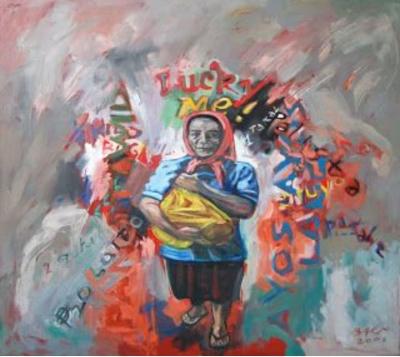All Souls Blog: David Rodriguez Goyes On The Criminology Of Colonial Inequality
Dr David Rodriguez Goyes is a post-doctoral researcher at the University of Oslo, Norway. He holds a PhD in criminology from the University of Oslo, Norway. He is a lawyer by training, with postgraduate studies in criminal law and a masters in sociology. He also holds an editorial position and is a member of various criminology journals. In his talk for the All Souls Seminar, he mooted for centring various forms of inequalities in the criminological analysis of criminality.
‘In every instance of a crime I have ever researched or experienced, there was always some form of inequality involved’
- David Rodriguez Goyes
Posted:
Time to read:
David Rodriguez Goyes believes that there exists some form of ‘criminological amnesia’ - we talk about inequality in criminology all the time but we fall short of critically researching its engagement with criminality. Aptly titled ‘We Talk About It All The Time”, a leaf taken from the heart-wrenching work of writer Camara Lundestad Joof, Goyes urged the criminological research to move beyond the ‘talking’ and to ‘exploit better’ the explicative potential of ‘criminology of inequality’.
Goyes began by bringing forward the existing and developing work that has inspired the move to foreground criminology of inequality. He quoted criminologist Karen Heimer who in her speech as a President of the American Society of Criminology had said, ‘... the study of inequality undergirds much of criminology. However, at times we may take the impact of inequalities for granted and miss opportunities to problematise straight links between inequalities and crime. Can we explore further and deeper the inequalities in crime?’. Further, Goyes then quoted Norwegian criminologist Katja Franko Aas who had asked for a more ‘explicit criminology of inequality’, the one which uses inequality to better understand criminality with all its complexities.
Arguing for developing a methodological framework to analyse criminality through the lens of inequalities, Goyes chalked out the starting point to be the exploration of ‘what do we mean by inequality and ‘what are the different kinds of inequalities that exist’. He urged for exploring different kinds of inequalities that exist in different parts of the world, and how they inform harm and criminality. ‘Inequality for whom (individual, group), inequality of what kind (social, political)’, these, as per Goyes, are significant vantage points for analysing criminology of inequality.

Goyes then took the attendees on a ‘journey through the criminology of social inequalities’. Various developments in theorising criminology - rational choice, Marxist, anomie, conflict - were discussed and critiqued for limiting their focus on just ‘economic inequality’. Goyes argued that these theories ignored more ‘symbolic forms of inequalities’ (ones that can’t be measured like money) while trying to understand criminality through ‘isolated factors’. He further critiqued that these theories generate invisibility towards other kinds of inequalities and their intersecting nature, while simultaneously stigmatizing certain groups as ‘criminals’. He believes that these theories deal with inequalities only in an ‘implicit manner’ and lack a global outlook.
There have been, however, developments in criminology which posed a more sophisticated outlook towards social inequalities in their theorising as well as methodologies. Goyes attributed southern criminology, feminist criminology, critical race theory, narrative criminology, and social democratic criminology as harbingers of this development. He commended these theories for their more ‘social approach’, where inequalities are seen as institutionalised and not individuated; or as sociologist Chares E Hurst said, ‘structured inequalities between categories of individuals that are systematically created, reproduced, and legitimated.’
Goyes further expounded on existing and developing work on criminology of inequality by citing significant contributions of Nigel South and Katja Franko Aas. While South broadened the scope of researching inequalities to class, religion, and social capital, Aas added ‘global security’ and ‘citizenship’ to the list.
Despite the developing literature that centres inequality in criminological analysis, Goyes believes that there’s still a potential to build a more ‘robust criminology of inequality’. This criminological outlook will be more global, think beyond economic inequalities, consider race as multidimensional and hierarchal, and refrain from conflating many ethnicities. It will also be creative and explore new dimensions of inequalities such as representation inequality, politico-legal inequalities (which gives rise to what Carolyn Hoyle called ‘victims of the state’), and epistemological inequalities. The research which focuses on criminology of inequality, Goyes said, would not look at inequality as an isolating factor but would interrogate intersecting impact of various forms of inequalities.
Goyes underlined the need to not limit research to exploring the link between inequalities and criminality. He urged for thinking beyond this causation aspect and interrogate how inequality relates to crime beyond facilitation, how inequality assists us in understanding criminality itself. He cited Rachel Condry and Jasmina Arnez’s work on criminological perspectives on youth offending to pose a question - can inequality still play a role where there has been no harm or crime? The idea is to go beyond the causal link between inequality and criminality and ask, ‘is inequality in itself a crime?’
Finally, arguing for more nuanced theorising of criminology of inequality, Goyes concluded his talk by reiterating, ‘ … criminology of inequality invites us to see the many hierarchies that appear when forms of power intersect at diverse levels. It leads us to a holistic analysis, and gives us better practical tools to understand and respond to crime and harm.’
Complement David Rodrigo Goyez’s work on criminology of inequality with Katja Franko Aas on Globalisation and Crime, and Goyez’s own work with Nigel South on Indigenous Worlds and Criminological Exclusion.
Post by: Karan Tripathi, reading for MSc in Criminology and Criminal Justice
Keywords:
Share:
